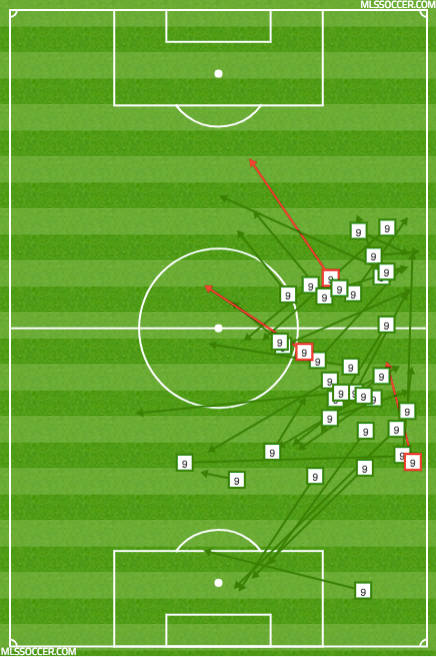TFC looked really good in the second half, as good as they’ve looked since the CCL final. Hard to say whether they can sustain it, but with their next two games at Atlanta and at home against NYCFC, they’ll have to.
The LA Galaxy’s defending
Excluding own goals, the LA Galaxy have given up 32 goals on 32.2 xGA, a below-average figure, if not at the futility level of MLS’s worst defending teams. They give up 14.4 shots per game, the worst of any current MLS playoff team.
There’s no doubt that the Galaxy’s defense is a prevalent weakness. No game passes without “what were they thinking” moments out of Michael Ciani and Jorgen Skjelvik.
They’ve settled on a 3-5-2 as their preferred formation, trading defensive solidity (they weren’t going to have much anyway, a known fact that probably went into the thought process) for attacking firepower. All four of Zlatan Ibrahimovic, Giovani dos Santos, Ola Kamara and Romain Alessandrini can plausibly play together in this set-up, the only alignment that comes close to getting them all together.
They risked that alignment against LAFC and survived long enough to storm back in the last 10 minutes for a wacky 2-2 draw. They risked it again — albeit with Chris Pontius (a natural winger, of course) in for the suspended Alessandrini — on Sunday against Orlando, and they produced a 4-3 win that lacked any viable defending.
The game against Orlando revealed a lot of the Galaxy’s defensive weaknesses. They were often disorganized and struggled to put pressure on Orlando’s attackers around the box. Defending from the front was always going to be a problem for this LA team, and that major weakness only compounds weaknesses deeper in the formation. They looked a lot better after Servando Carrasco came on as a sub.
42 percent of Orlando’s attacks came down their left side, attacking right-sided center back Dave Romney. Central defenders in a three-at-the-back have to defend in space, meaning they have to possess some measure of athleticism. Romney doesn’t fit the bill. Mohamed El-Munir (usually a left back!) roasted Romney on numerous occasions:








